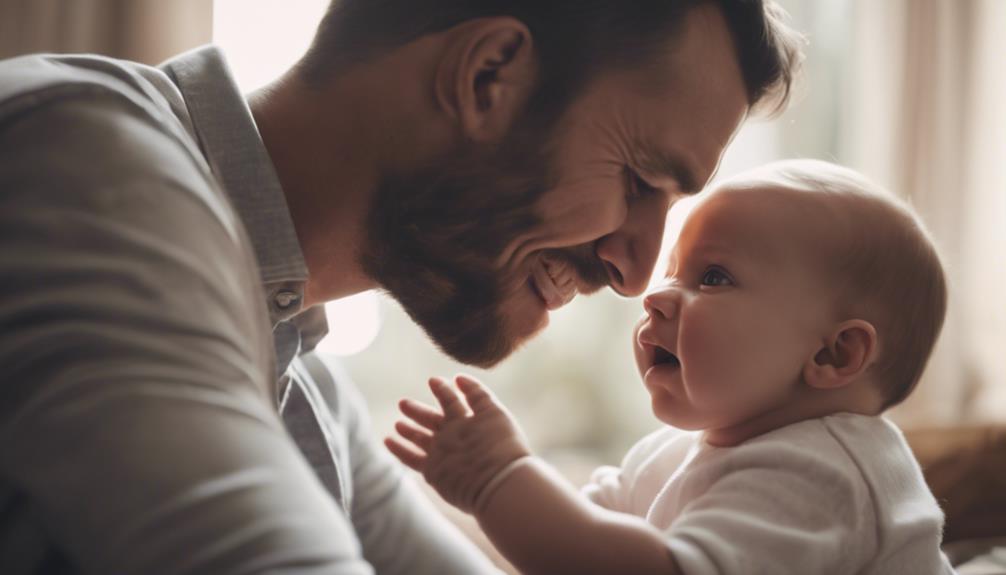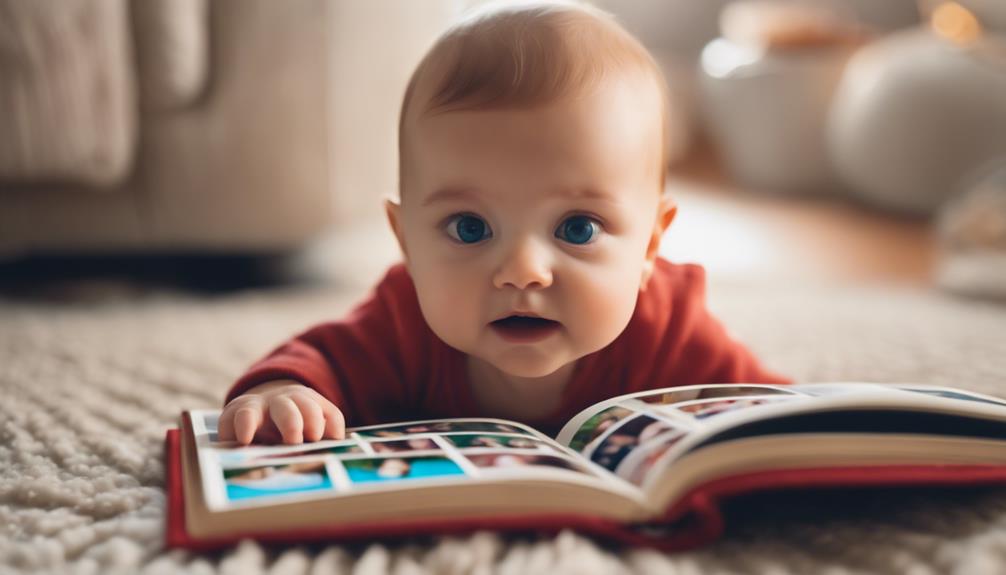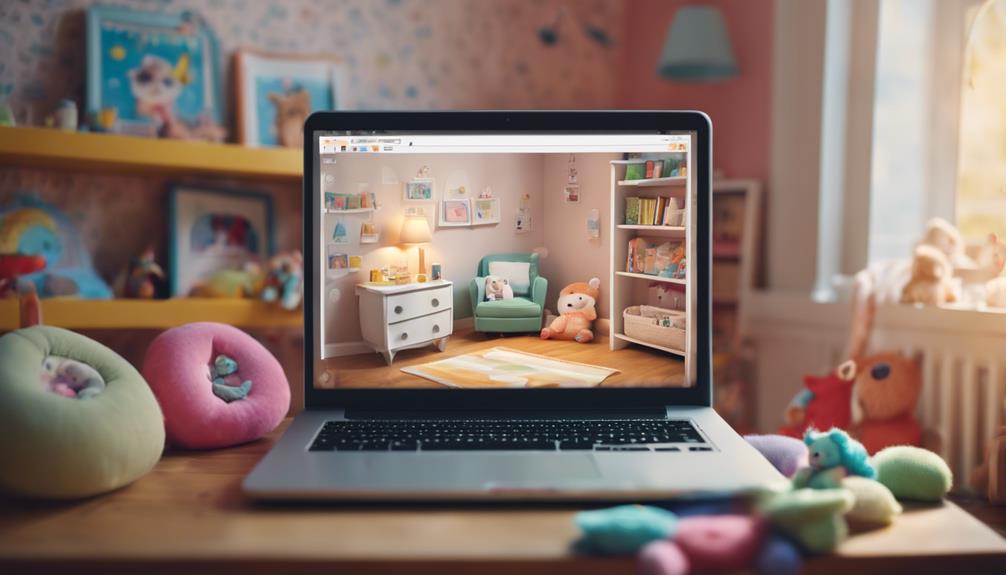To boost your baby’s language skills, concentrate on maintaining eye contact, imitating actions, reading books daily, using family photos, and engaging in continuous conversation. Eye contact and taking turns help develop communication skills. Imitating actions supports learning and speech development. Reading promotes language growth. Family pictures improve memory and cognitive skills. Talking enhances vocabulary and pronunciation. Participating in these activities will effectively support your baby’s language development journey.
Key Takeaways
- Maintain eye contact and take turns speaking to establish a strong connection and lay the foundation for social and language development.
- Imitate your baby's actions and speech sounds to promote early learning and aid in language acquisition.
- Read books and talk daily to nurture vocabulary, introduce new words, and develop language abilities.
- Use pictures of family members to enhance cognitive development, boost language skills, and promote early learning.
- Continuously talk and expose your baby to language to foster language skills, boost vocabulary, and help with word pronunciation.
Establishing Eye Contact and Turn-Taking
To establish a strong connection with your baby and enhance communication skills, consistently make eye contact during interactions. When engaging in turn-taking exchanges with your baby, you're laying the groundwork for their social and language development. By encouraging your baby to take turns in conversations, you're helping them understand the dynamics of communication. Through these interactions, your baby learns the essential social cues and language patterns necessary for conversation development.
Engaging in turn-taking activities with your baby fosters a sense of reciprocity, where they begin to recognize the back-and-forth nature of communication. This reciprocal exchange not only enhances their language skills but also strengthens the bond between you and your baby.
Imitating Actions and Speech Sounds

Consistently imitating your baby's actions and speech sounds is a key method to promote their early learning and communication skills. By mimicking the movements and sounds they observe, you are helping them understand communication through gestures and vocalizations. When you mirror simple speech sounds like 'ba' or 'ma', you are aiding your baby in practicing early speech development. Encouraging your little one to imitate actions and speech sounds not only fosters language acquisition but also enhances their overall communication skills. This fundamental interaction allows babies to explore and engage more effectively with the world around them.
| Benefits of Imitating Actions and Speech Sounds |
|---|
| – Promotes early learning |
| – Enhances communication skills |
| – Aids in language acquisition |
Reading Books and Talking Daily
Engaging with books and daily conversations is essential for nurturing your baby's vocabulary and language skills from an early age. Reading books to your baby not only introduces them to new words but also helps in developing their language abilities.
Pointing to pictures in books and describing them can further aid in expanding your baby's vocabulary. Additionally, talking to your baby throughout the day exposes them to a variety of words and encourages their language development.
Creating a consistent routine of reading books and talking to your baby can greatly promote early literacy and language acquisition. Remember, even simple words like 'hi' and 'bye' in your daily conversations can help babies learn and understand language better.
Using Pictures of Family Members

Looking at pictures of family members is a simple yet effective way to enhance your baby's cognitive development and language skills. When you show your baby photos of family members, you're helping them associate names with faces, which aids in memory and recognition skills.
Using a tablet or phone to display these pictures can engage your baby visually and promote early learning. Pointing to the pictures and describing the family members can help your baby connect words with real-life people, thereby enhancing their vocabulary development.
It's beneficial to practice saying names and greetings while looking at family photos. This not only introduces new words to your baby but also encourages language growth. By incorporating family photos into your daily routines, you create meaningful interactions that strengthen the parent-child bond through shared experiences.
These interactions foster a sense of familiarity and connection for your baby, supporting their overall language development and cognitive skills.
Continuous Talking and Language Exposure
Consistently engaging in dialogue with your baby is essential for fostering their language skills, even if they aren't responding immediately.
To provide continuous language exposure, try talking to your baby during daily routines such as feeding, bathing, and playing. Using a sing-songy voice can capture their attention and make language more engaging.
Establish positive interactions through talking to encourage your baby's communication attempts and language development. Additionally, implementing a bedtime story-time routine can boost vocabulary by pointing to pictures, describing them, and highlighting simple words.
Remember, babies learn to speak by hearing the words around them, so talking frequently and using proper words can help them learn to pronounce words correctly.
Frequently Asked Questions
How Can I Help My Baby Learn His First Words?
You can help your baby learn his first words by engaging in daily conversations, using real words in context, encouraging gestures, making reading routine, and providing positive reinforcement. These actions support early language development.
How Do Infants Build Their Vocabulary?
You build your baby's vocabulary by immersing them in words, conversations, and books. Reading aloud, associating words with images, and encouraging vocalization help develop their language skills. Contextual learning enhances their vocabulary acquisition from an early age.
What Is the Average Age for a Baby to Say First Word?
You can expect a baby to say their first word around 12 months on average. Some might start as early as 9-10 months. Girls usually begin speaking a bit sooner than boys. Early exposure to language is key.
What Is the Most Common First Word for a Baby?
Like a warm hug, a baby's first word often embraces your heart. 'Mama' and 'dada' frequently lead the way, echoing their love and simplicity. These cherished sounds mark the start of your baby's vocal journey.
Conclusion
As you continue to build your baby's first vocabulary, remember that every interaction counts. Just like planting seeds in a garden, each word spoken and action taken helps to nurture and grow your little one's language skills.
So keep talking, reading, and engaging with your baby every day. Before you know it, you'll be amazed at how quickly their vocabulary blossoms and their communication skills flourish.
Keep up the great work!










